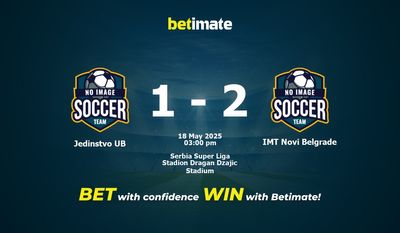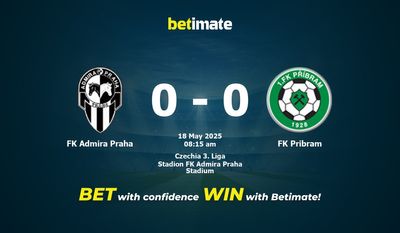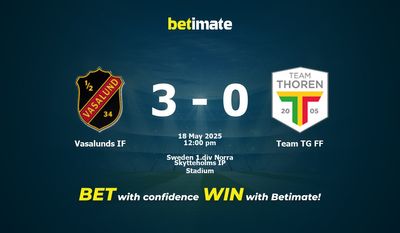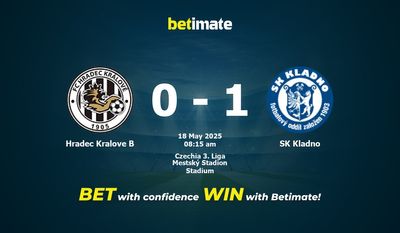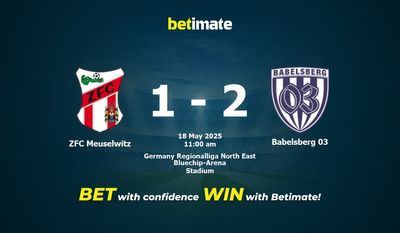Quick Betimate
Popular Leagues
-
UEFA Nations League
-
England (22)
- FA Cup
- Premier League (9)
- Championship (1)
- League 1 (1)
- League 2 (1)
- National League (2)
- National League North (1)
- National League South (1)
- EFL Trophy
- Premier League 2
- Championship Women
- Development League 2 (1)
- FA Cup Women (1)
- FA Trophy
- FA Vase
- Isthmian Division One North
- Isthmian Division One South
- Isthmian Premier Division
- National League Cup
- Northern League Division One
- Northern Premier League
- Reserve Matches
- Southern Premier League Central
- Southern Premier League South
- Super League Women
- U21 Premier League Cup
- Northern Ireland Championship
- Northern Ireland Championship Women
- Northern Ireland Cup
- Northern Ireland Intermediate Cup
- Northern Ireland League Cup Women
- Northern Ireland Play-Offs
- Northern Ireland Premier
- Northern Ireland Premier Intermediate League
- Northern Ireland Premier League Women (4)
- Northern Ireland Reserve League
- Scotland Regional Cup
- Wales League Cup Women
-
UEFA Champions League (1)
-
UEFA Europa League (1)
-
Spain (119)
- La Liga (10)
- Segunda (5)
- Tercera Group 1 (2)
- Tercera Group 2 (3)
- Tercera Group 3 (2)
- Tercera Group 4 (2)
- Tercera Group 5 (2)
- Tercera Group 6 (2)
- Tercera Group 7 (2)
- Tercera Group 8 (2)
- Tercera Group 9 (2)
- Tercera Group 10 (2)
- Tercera Group 11 (2)
- Tercera Group 12 (2)
- Tercera Group 13 (2)
- Tercera Group 14 (2)
- Tercera Group 15 (2)
- Tercera Group 16 (4)
- Tercera Group 17 (3)
- Tercera Group 18 (2)
- Youth League (4)
- Copa De La Reina (1)
- Copa del Rey
- Kings League - 40 mins play (1)
- Primera Division RFEF Group 1 (10)
- Primera Division RFEF Group 2 (10)
- Primera Federacion Women (1)
- Primera Women (8)
- Queens League - 40 mins play
- Regional Cup
- Regional League
- Segunda Division RFEF Group 1
- Segunda Division RFEF Group 2
- Segunda Division RFEF Group 3
- Segunda Division RFEF Group 4
- Segunda Division RFEF Group 5
- Segunda Division RFEF Play-Offs (10)
- Segunda Federacion Women
- Tercera - Play-Offs (19)
- Tercera Federacion Women
- Women Regional League
-
USA (795)
-
Germany (75)
- Bundesliga I
- Bundesliga II (9)
- DFB Pokal (1)
- Regionalliga Bayern
- Regionalliga North (3)
- Regionalliga North East (8)
- Regionalliga South West
- Regionalliga West
- Oberliga Baden-Wuerttemberg (1)
- Oberliga Bayern North
- Oberliga Bayern South
- Oberliga Bremen
- Oberliga Hamburg
- Oberliga Hessen (1)
- Oberliga Mittelrhein (6)
- Oberliga Niederrhein (8)
- Oberliga Niedersachsen (9)
- Oberliga NOFV Nord (2)
- Oberliga NOFV Sud (8)
- Oberliga Rheinland-Pfalz/Saar (5)
- Oberliga Schleswig-Holstein
- Oberliga Westfalen (5)
- 3. Liga
- Bundesliga II Play-Offs
- Bundesliga II Women (7)
- Bundesliga Play-Offs
- Bundesliga U19 (1)
- Bundesliga Women
- DFB Pokal Women
- Regionalliga Play-Offs
- U19 Cup (1)
-
Italy (34)
- Serie A (9)
- Serie B (1)
- Serie C Group A
- Serie C Group B
- Serie C Group C
- Campionato Nazionale
- Campionato Primavera 1 (2)
- Campionato Primavera 2 (2)
- Serie D (3)
- Coppa Italia
- Coppa Italia Women
- Campionato Primavera 3
- Campionato Primavera 4
- Serie A Women
- Serie B Play-Offs (4)
- Serie B Women (1)
- Serie C Play-Offs (4)
- Serie C Super Cup
- Serie D Play-Offs (8)
- U19 League Women
-
France (15)
-
Netherlands (25)
-
Scotland (10)
-
Japan J-League (2)
-
Japan J2-League (3)
-
Denmark Superligaen (5)
-
Cyprus Division 1 (3)
-
Israel Premier League (2)
-
Colombia Primera A (5)
-
Indonesia Liga 1 (3)
-
Colombia Primera B (7)
-
Esport (110)
Other Leagues
-
Albania
-
Algeria (5)
-
Andorra (5)
-
Angola (4)
-
Argentina (86)
- Nacional B (10)
- Primera B Metropolitana (9)
- Primera C Metropolitana (12)
- Reserve League
- Cup (11)
- Torneo A (18)
- Copa Santa Fe
- Championship Women (7)
- Copa de la Liga Profesional
- Copa Santa Fe Women
- Liga Profesional (4)
- Liga Profesional Reserves (15)
- Nacional Reserve League
- Regional League
- Youth League
-
Armenia (8)
-
Aruba (3)
-
Australia (85)
- A-League (2)
- A-League Women (1)
- Capital Territory NPL2 (4)
- Capital Territory NPL2 U23 League
- Capital Territory Premier League (2)
- Capital Territory Premier League Women
- Capital Territory Premier League Women Reserves
- Capital Territory U23 League
- Cup
- Cup Qualifying
- Darwin Premier League
- FFA Cup Qualifying
- New South Wales League 1 (8)
- New South Wales League 2
- New South Wales NPL Women (6)
- New South Wales NPL2 Women
- New South Wales Premier League (3)
- New South Wales U20 League (1)
- Northern NSW Division 1 (2)
- Northern NSW Premier League (1)
- Northern NSW Premier League Women (1)
- Northern NSW Reserves League
- NPL Queensland (3)
- NPL Queensland U23
- NPL Queensland Women (2)
- NPL Victoria (2)
- NPL Victoria U23 (2)
- NPL Victoria Women (1)
- NSW League 1 U20
- NSW League 2 U20
- Queensland PL 2 U23
- Queensland PL U23
- Queensland Premier League (1)
- Queensland Premier League 2 (2)
- Queensland Premier League 2 Women
- Queensland Premier League 3 (3)
- Queensland Premier League 4
- Queensland Premier League Women
- SA Premier League Reserves
- SA Premier League Women (5)
- SA Premier League Women Reserves
- South Australia Premier League (2)
- South Australia State League 1 (6)
- South Australia State League Reserves
- Sunday League Premier Division
- Sunday League Premier Division Reserve
- Tasmania Championship (4)
- Tasmania Championship 1
- Tasmania Championship Women
- Tasmania NPL U21 League
- Tasmania Premier League (4)
- Tasmania South Division 1
- Tasmania Super League Women
- Victoria PL 1 U23
- Victoria Premier League 1 (2)
- Victoria Premier League 2
- Victoria Premier League Women
- Victoria State League 1
- Victoria State League 1 Reserves
- Victoria State League 2
- Victoria State League 2 Reserves
- WA Premier League Women (1)
- WA Premier League Women U21
- WA State Cup Women (2)
- WA State League 1 Reserves
- Western Australia Premier League (6)
- Western Australia State League 1 (6)
- Western Australia State League 1 Women
- Western Australia State League 2
- Western Australia U23 League
- Australian Matches
-
Austria (40)
-
Azerbaijan (8)
-
Bahrain
-
Bangladesh (5)
-
Barbados (2)
-
Belarus (7)
-
Belgium (4)
-
Benin
-
Bhutan
-
Bolivia (14)
-
Bosnia & Herzegovina (11)
-
Botswana (8)
-
Brazil (177)
- Serie A (7)
- Serie B (5)
- Serie C (6)
- Campeonato Amapaense
- Campeonato Baiano 2 (4)
- Campeonato Brasileiro A2 Women (3)
- Campeonato Brasileiro Serie B U20 (4)
- Campeonato Carioca A2 (1)
- Campeonato Carioca B (6)
- Campeonato Goiano 2 (4)
- Campeonato Maranhense
- Campeonato Mineiro 2 (6)
- Campeonato Mineiro U20 (3)
- Campeonato Paranaense 2 (2)
- Campeonato Paulista A4
- Campeonato Paulista U20 (3)
- Catarinense 2 (4)
- Copa Espirito Santo (4)
- Copa Nordeste (4)
- Copa Rio Women
- Copa Verde
- Matches
- Matches Women
- Paraense
- Paulista Cup (11)
- Paulista Serie B (3)
- Paulista Women (4)
- Serie A U20 (10)
- Serie A1 Women (5)
- Serie A2 Women (1)
- Serie A3 Women (12)
- Serie D (20)
- U20 Cup
- U20 League (29)
- U20 Women Cup
- Copa do Brasil (16)
- Women’s Friendly
-
Bulgaria (6)
-
Burkina Faso
-
Burundi
-
Cambodia (3)
-
Cameroon (8)
-
Canada (8)
-
Chile (12)
-
China (38)
-
Colombia (15)
-
Costa Rica (3)
-
Côte d’Ivoire (8)
-
Croatia (16)
-
Cuba
-
Cyprus (3)
-
Czech Republic (48)
-
Denmark (43)
-
Djibouti
-
Dominica (2)
-
Dominican Republic
-
Ecuador (15)
-
Egypt (16)
-
El Salvador (2)
-
Estonia (14)
-
Ethiopia (5)
-
Faroe Islands (12)
-
Fiji
-
Finland (107)
-
Gambia (7)
-
Georgia (10)
-
Ghana (8)
-
Gibraltar
-
Greece (7)
-
Guatemala (3)
-
Haiti (5)
-
Honduras (2)
-
Hong Kong SAR China (16)
-
Hungary (30)
-
Iceland (34)
-
India (1)
-
Indonesia (3)
-
Iran (11)
-
Iraq (10)
-
Ireland (15)
- Republic of Ireland FAI Cup (2)
- Republic of Ireland FAI Intermediate Cup
- Republic of Ireland First Division (5)
- Republic of Ireland Leinster Senior Cup
- Republic of Ireland Leinster Senior League
- Republic of Ireland Munster Senior League
- Republic of Ireland National League Women (6)
- Republic of Ireland Premier Division (2)
- Republic of Ireland U20 League
-
Israel (11)
-
Jamaica (2)
-
Japan (55)
-
Jordan
-
Kazakhstan (12)
-
Kenya (8)
-
Kuwait (5)
-
Kyrgyzstan (1)
-
Latvia (9)
-
Lebanon (5)
-
Liechtenstein (1)
-
Lithuania (15)
-
Luxembourg (17)
-
Macau SAR China
-
Macedonia (11)
-
Malawi (9)
-
Malaysia
-
Mali
-
Malta (1)
-
Mauritania (2)
-
Mexico (7)
-
Moldova (6)
-
Mongolia
-
Montenegro (10)
-
Morocco (9)
-
Mozambique (1)
-
Myanmar (Burma) (1)
-
Namibia
-
Nepal
-
New Zealand (16)
-
Nicaragua (1)
-
Niger
-
Nigeria (11)
-
Norway (99)
- Eliteserien (8)
- Division 1 (8)
- Cup (8)
- Cup Women (8)
- Division 1 Play-Offs
- Division 1 Women (6)
- Division 2 Group 1 (7)
- Division 2 Group 2 (7)
- Division 2 Group 3
- Division 3 Group 1 (7)
- Division 3 Group 2 (7)
- Division 3 Group 3 (7)
- Division 3 Group 4 (7)
- Division 3 Group 5 (7)
- Division 3 Group 6 (7)
- Interkretsserie U19
- Toppserien Women (5)
- U19 Elite League
- Youth Cup
-
Oman (1)
-
Panama (3)
-
Paraguay (17)
-
Peru (16)
-
Philippines
-
Poland (30)
-
Portugal (7)
-
Puerto Rico (1)
-
Qatar
-
Romania (35)
-
Russia (25)
-
Rwanda (2)
-
Saint Kitts and Nevis (1)
-
San Marino (1)
-
Saudi Arabia (20)
-
Senegal (6)
-
Serbia (10)
-
Seychelles
-
Sierra Leone (3)
-
Singapore (4)
-
Slovakia (14)
-
Slovenia (7)
-
Solomon Islands
-
South Africa (9)
-
South Korea (17)
-
Suriname (1)
-
Sweden (58)
- Europe Friendlies
- Allsvenskan Qualification
- Superettan Qualification
- 1.div Norra (3)
- Cup (1)
- 1.div Södra (2)
- 2.div Norra Götaland (1)
- 2.div Norra Svealand (2)
- 2.div Norrland (2)
- 2.div Södra Götaland (3)
- 2.div Södra Svealand (4)
- 2.div Västra Götaland (3)
- Allsvenskan (8)
- Cup Qualification (6)
- Cup Women (1)
- Damallsvenskan (1)
- Div 1 Relegation (8)
- Elitettan (4)
- Juniorallsvenskan (7)
- Superettan (2)
-
Switzerland (21)
-
Taiwan
-
Tajikistan
-
Tanzania (8)
-
Thailand (7)
-
Togo (4)
-
Trinidad and Tobago (2)
-
Tunisia (17)
-
Turkey (19)
- Türkiye 1 Lig (2)
- Türkiye 2 Lig Beyaz
- Türkiye 2 Lig Kirmizi
- Türkiye 2.Lig Play-offs (4)
- Türkiye 3. Lig Promotion Group Play-off (2)
- Türkiye 3.Lig Group 1 (1)
- Türkiye 3.Lig Group 2
- Türkiye 3.Lig Group 3
- Türkiye 3.Lig Group 4 (1)
- Türkiye Cup
- Türkiye Super Lig (8)
- Türkiye U19 League (1)
- Türkiye Womens League
-
Uganda (4)
-
Ukraine (18)
-
United Arab Emirates (14)
-
Uruguay (26)
-
Uzbekistan (8)
-
Venezuela (12)
-
Vietnam (9)
-
Wales (1)
-
Zambia
-
Zimbabwe (1)
Lying Down Behind Free Kick Wall: The Art of Football Strategic

Football is a sport that captures the hearts and minds of millions around the world. It is a game of strategy, skill, and sometimes, a touch of theatricality.
If you've ever watched a football match, you've likely noticed the occurrence of players lie down behind free kick wall. It's a moment that can spark both excitement and frustration among fans and a question "why do footballers lie down for free kicks" is raised. Some players seem to collapse dramatically, clutching their legs or faces, while others seem to endure a sudden loss of balance. This theatrical display has become ingrained in the game and has raised questions about its purpose and legitimacy.
In this article, we aim to shed light on the motives behind footballers lying down behind free kick wall. We will delve into the psychological and strategic factors that contribute to this behavior. By understanding the underlying reasons, we can gain a deeper appreciation for the intricacies of the game and the tactics employed by players. So, let's uncover the secrets behind the dramatic moments on the football field and explore why footballers choose to lie down for free kicks.
Importance of Free Kicks in Football
Significance of free kicks in the game of football
Free kicks are a critical part of football, playing a vital role in the flow and outcome of a match. They are awarded to a team when an opposing player commits a foul, such as tripping, pushing, or handling the ball. The attacking team is then granted a chance to take a shot on goal without interference from the defending team. This set-piece opportunity allows teams to plan and execute specific plays, increasing their chances of scoring a goal.
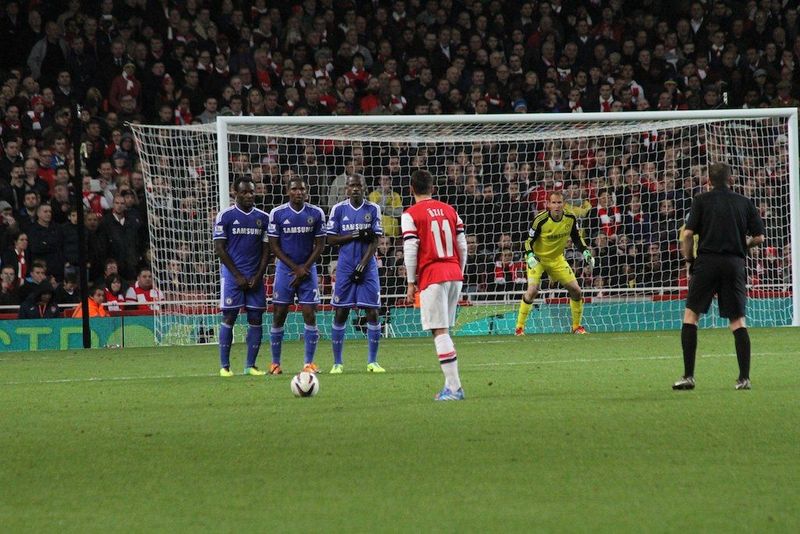
Free kicks are a critical part of football
The importance of free kicks lies in their potential to lead to goals, which can ultimately decide the outcome of a match. They provide teams with a chance to score from a relatively close range, increasing the likelihood of hitting the target and finding the back of the net. Free kicks are often taken just outside the penalty area, a prime location for launching accurate and powerful shots on goal.
How free kicks can greatly influence match outcomes
Free kicks have the power to greatly influence the outcomes of football matches. As a set-piece opportunity, free kicks allow teams to plan and execute specific plays to increase their chances of scoring a goal. Whether shooting directly at the goal or employing strategic tactics like crosses or dummies, teams can confuse the defending side and create openings for shots. A well-executed free kick can serve as a game-changer, potentially shifting the momentum in favor of the team taking the kick.
One of the reasons why free kicks carry such importance is their potential for goals from a relatively close range. When teams are closer to the opposing goal, their chances of scoring increase significantly. Free kicks are often taken from just outside the penalty area, providing an advantageous position for the attacking team to hit the target and find the back of the net. Additionally, free kicks are frequently awarded in dangerous areas, such as near the box, which further enhances the probability of scoring a goal.
Furthermore, the psychological impact of a well-executed free kick should not be underestimated. If a team is trailing in a match, a skillfully taken free kick can ignite the spark needed to turn the tide and make a comeback. On the other hand, when a team is leading, a goal resulting from a free kick can demoralize the opposition, making it arduous for them to mount a successful counterattack. The influence of free kicks extends beyond the immediate moment, leaving a lasting impression on the outcome of the game.
The strategic nature of free kicks
Free kicks are not only about raw power and accuracy but also about strategy and creativity. Teams can utilize various tactics and maneuvers to outwit their opponents during these set-piece situations. They can opt for a direct shot at the goal, but they can also employ strategies like crosses or dummies or lying down behind free kick wall to confuse the defending team and create openings for scoring opportunities.
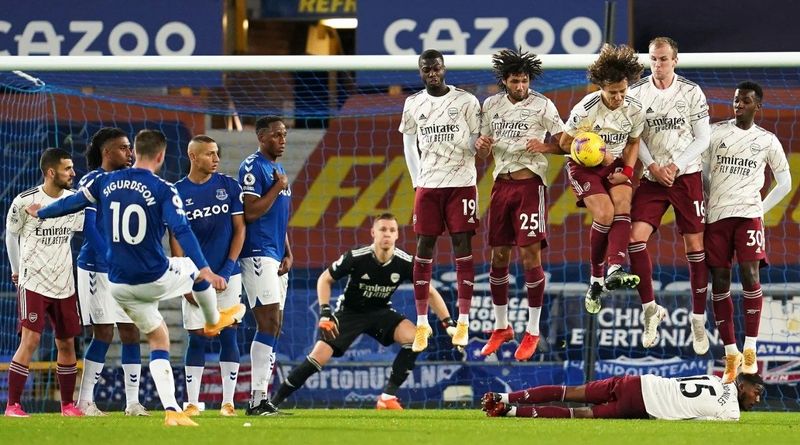
Free kicks are not only about raw power and accuracy but also about strategy and creativity
Successful free kicks require skillful execution, involving players who possess the ability to read the game, improvise, and think outside the box. The best free-kick takers are often the most creative and inventive players on the field. Their vision, technique, and ability to strike the ball with precision can result in goals that lead their team to victory.
It can be said that free kicks play a significant role in the game of football. They offer teams set-piece opportunities to score goals, influence the momentum of a match, and require skillful execution and strategic thinking. The importance of free kicks cannot be underestimated, as they can often be the deciding factor between success and failure on the football field. So, the next time you watch a football match, pay close attention to the free kicks, as they might just shape the outcome of the game.
Lying down for free kicks wall strategy
Who invented lying behind free kick wall in football?
Just like many other techniques in football, it is difficult to pinpoint the exact inventor of this approach. Nevertheless, freekick takers have long been known to bypass the defensive wall by driving the ball low.
The effectiveness of the low freekick technique persisted until a Brasileiro Série A match in 2013 between Figueirense and Palmeiras. In that game, Figueirense midfielder Ricardinho threw himself to the ground in an attempt to thwart an anticipated low freekick from Valdivia, Palmeiras' specialist in freekicks.
Similarly, in another league match, a Ponte Preta defender tried to lie down behind free kick wall method to block a freekick from Lucio Flavio, a midfielder for Paraná Clube. Although the technique was not very successful, it intrigued the football world, especially when high-profile footballers like Marcelo started crouching behind the wall. Marcelo employed this strategy while playing for Brazil during a World Cup qualifier against Argentina in 2016.
Another Brazilian international teammate, Coutinho, also utilized this tactic in a 2016 Premier League match. Coutinho knelt behind the wall to prevent an attempt from Christian Eriksen, a midfielder for Tottenham.
Is it legal to lie behind the wall in football?
The Laws of the Game do not contain any specific rules that prohibit a defensive approach involving lying behind free kick wall . Therefore, unless a foul or handball is committed in the process, it is permissible to adopt this tactic.
According to Rule 13 (Free Kicks) in the Laws of the Game, there is no offense committed when a player chooses to lie behind the wall. This means that any player is allowed to position themselves in this manner to block low freekicks. While it may be an unconventional technique, lying behind the wall has proven to be highly effective and falls within the boundaries of the rules in football.
Why do footballers lie down for free kicks: Explanation
Tactical Advantage, Psychological Warfare and Time-Wasting
How players lying down during free kicks can provide a tactical advantage?
Why do footballers lie down for free kicks? Because lying down for free kicks can offer footballers a tactical advantage in several ways. Firstly, it creates a visual obstacle for the free-kick taker, making it harder for them to spot gaps or open spaces in the defensive wall. When a player lies down behind free kick wall, they obstruct the low trajectory of the ball, forcing the free-kick taker to either shoot over the wall or find a different strategy to score. This obstructive tactic can increase the chances of a blocked or off-target shot.
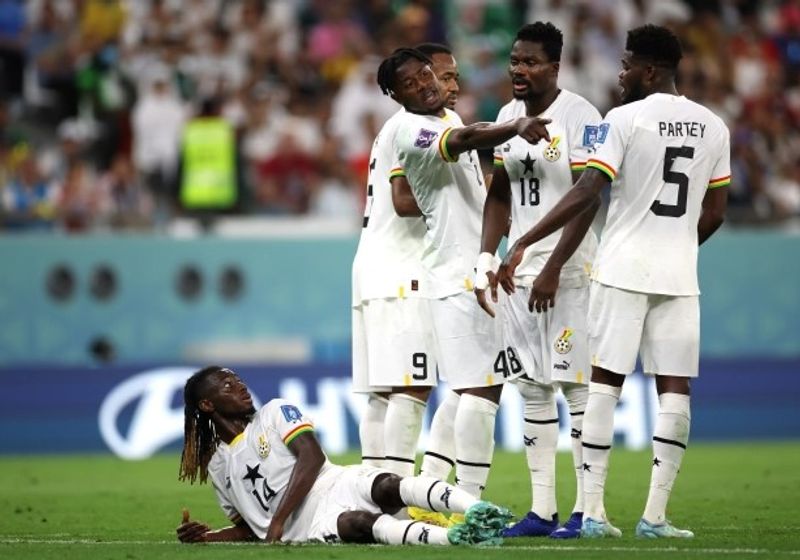
Lying down during free kicks can offer footballers a tactical advantage in several ways
Secondly, the act of lying down for free kick adds an element of surprise to the defensive strategy. It catches the opposition off guard, as it deviates from the traditional defensive techniques employed during free kicks. The sudden presence of a player lying on the ground disrupts the flow of the attacking team and may cause them to hesitate or change their intended shot placement.
How it can affect the opposing team?
Deception plays a significant role in the tactical advantage gained by footballers lying down behind free kick wall. By deceiving the opposition, players create uncertainty and confusion, forcing them to question their defensive positioning and decision-making. The presence of a player lying down introduces an unexpected element that the attacking team must account for, potentially leading to errors or suboptimal shot selection.
Furthermore, the act of deception can influence the mental state of the free-kick taker. When confronted with an unconventional defensive setup, they may experience a moment of doubt or hesitation, affecting their confidence and execution. This psychological impact can be advantageous for the defending team, as it increases the likelihood of a less accurate or weaker shot.
Lying down for free kicks can disrupt the defensive wall by introducing a physical barrier that alters the dynamics of the wall itself. When a player lies flat on the ground, it creates an additional layer in the defensive structure, making it harder for the attacking team to find a clear path to the goal. The presence of a player lying down forces the opposition to adjust their positioning and potentially creates gaps or spaces in the wall that can be exploited by the attacking team.
Moreover, lying down can confuse the goalkeeper by obstructing their line of sight and introducing unexpected visual cues. The presence of a player on the ground can create a momentary distraction or make it challenging for the goalkeeper to anticipate the trajectory of the ball accurately. This confusion can lead to delayed reactions or misjudgments, increasing the chances of a successful save for the attacking team.
Concept of Time-Wasting and How Players May Exploit It
Time-wasting is a ideal reason why do footballers lie down for free kicks, especially when a team is leading and wants to preserve the result. By lying down during free kicks, players can effectively waste time and disrupt the rhythm of the game. The act of lying down delays the restart of play, frustrating the opposing team and reducing their opportunities to launch quick counter-attacks. Players may exploit this tactic by exaggerating injuries or taking their time to get up after lying down, further extending the time wasted.
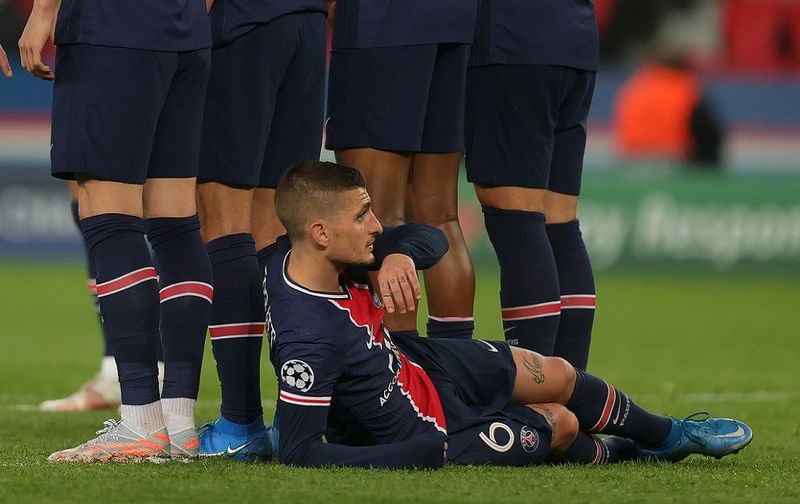
By lying down during free kicks, players can effectively waste time and disrupt the rhythm of the game
The tactics of lying down during free kicks and time-wasting can significantly impact the flow and rhythm of the game. Football is a sport that thrives on continuous action and fluid movement. When players employ these tactics, it disrupts the natural flow of the game, leading to frequent stoppages and breaks in play. This can frustrate both players and spectators, as it slows down the tempo of the match and reduces the excitement and intensity.
The referees play a crucial role in managing these tactics and ensuring that the game maintains its pace. They have the authority to penalize players for excessive time-wasting and can add extra time at the end of each half to compensate for the interruptions. However, striking a balance between allowing strategic play and preventing excessive time-wasting remains a challenge.
Gaining Referee's Attention
Role of referees in officiating free kicks
Referees play a crucial role in officiating free kicks in football matches. Their primary responsibility is to ensure fair play, maintain order, and enforce the laws of the game. When a free kick is awarded, the referee must position themselves appropriately to have a clear view of the situation and make accurate decisions. They need to assess the position of the ball, the position of the defensive wall, and the actions of the players involved. Referees must be vigilant and attentive to detect any potential fouls, infringements, or unsporting behavior during the free kick process.
How players lying down can catch the referee's attention?
Players lying down during free kicks can catch the referee's attention for several reasons. Firstly, it disrupts the usual defensive formation and catches the eye due to its unconventional nature. When a player lies down, it creates a visual contrast against the standing players, drawing the referee's focus. Secondly, it serves as a strategic tactic to counter low free kicks that aim to go under the defensive wall.
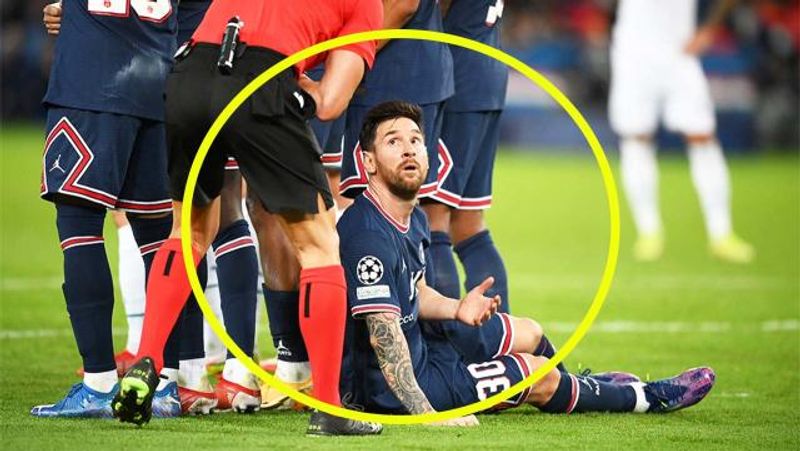
Lying down for free kick may gain referee's attention
By lying down behind free kick wall, a player blocks the space under the wall, making it more difficult for the ball to pass through. This tactic can be visually striking and may prompt the referee to pay closer attention to the positioning and actions of both the attacking and defending players.
Potential for drawing fouls or gaining favorable decisions
When players lie down during free kicks, there is a potential for drawing fouls or gaining favorable decisions from the referee. If an opposing player inadvertently makes contact with a player lying on the ground, it may be perceived as a foul, leading to the attacking team being awarded another free kick or potentially even a penalty.
The act of lying down can also create the perception of vulnerability or injury, which might influence the referee to be more lenient towards the team that employed this tactic. Players may exploit this situation to gain an advantage by exaggerating any contact or acting in a way that suggests they have been fouled.
Players who lie down behind free kick wall
Lionel Messi
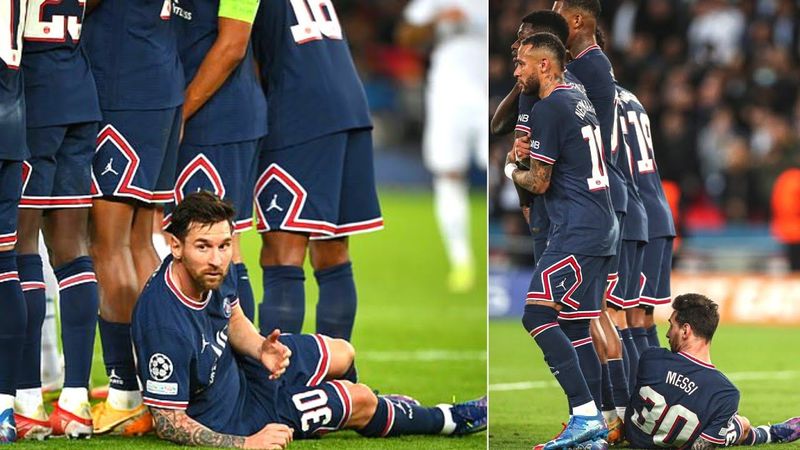
Lionel Messi lies down behind the free kick wall
Messi is hailed as one of the greatest players of all time, having won the most Ballon d'Or awards. He achieved remarkable success with Barcelona and Argentina before moving to Paris Saint-Germain. Renowned for his magnificent free kicks, Messi recently employed a strategy of lying down behind free kick wall during a Champions League group stage match against Manchester City.
With Kevin De Bruyne preparing to take a set piece, Messi took the necessary steps to obstruct any low shots from the Belgian player underneath the wall. As a result, De Bruyne was forced to alter his approach and opted for a higher placement, which was ultimately saved by the goalkeeper.
Marcelo Brozovic
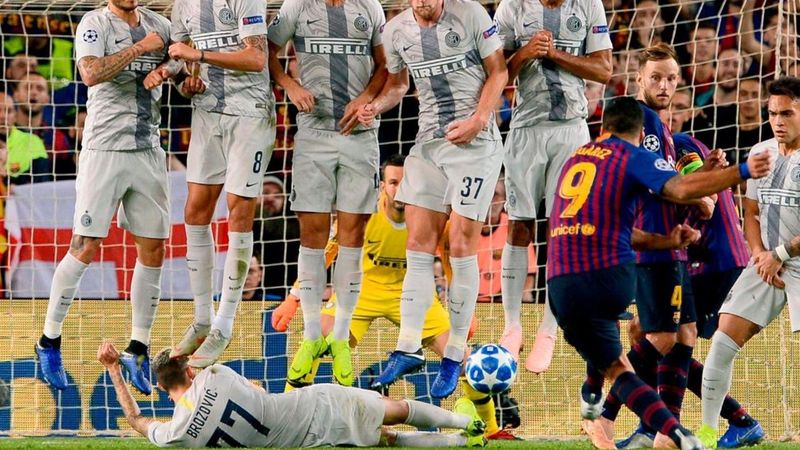
Marcelo Brozovic lies down behind the free kick wall
Marcelo Brozovic, a player for Inter Milan, employed this strategy during a Champions League match against Barcelona in 2018. Just before a free kick taken by Luis Suarez, Brozovic cleverly slid down behind the defensive wall to disrupt the trajectory of the shot.
Douglas Costa
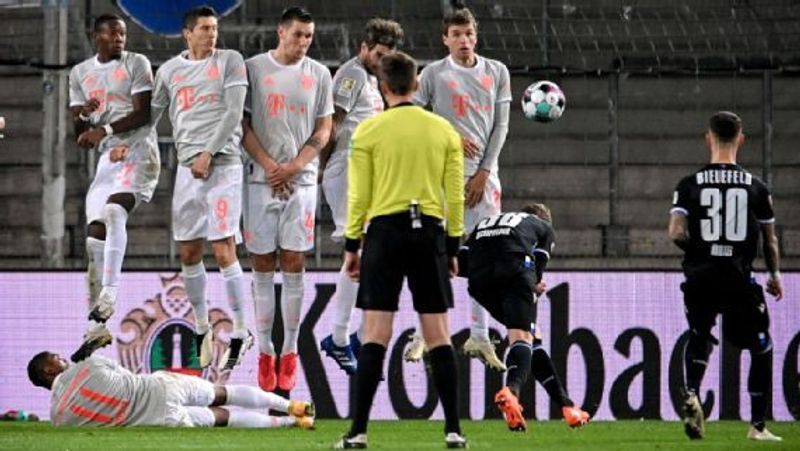
Douglas Costa lies down behind the free kick wall
Douglas Costa, known for his mesmerizing skills and intimidating dribbles, has enjoyed remarkable success, particularly with clubs like Bayern Munich and Juventus. He has also showcased his talent on the international stage representing Brazil. In a Bundesliga match, Costa made the decision to position himself by lying down behind free kick wall formed by his Bayern Munich teammates.
Joshua Kimmich
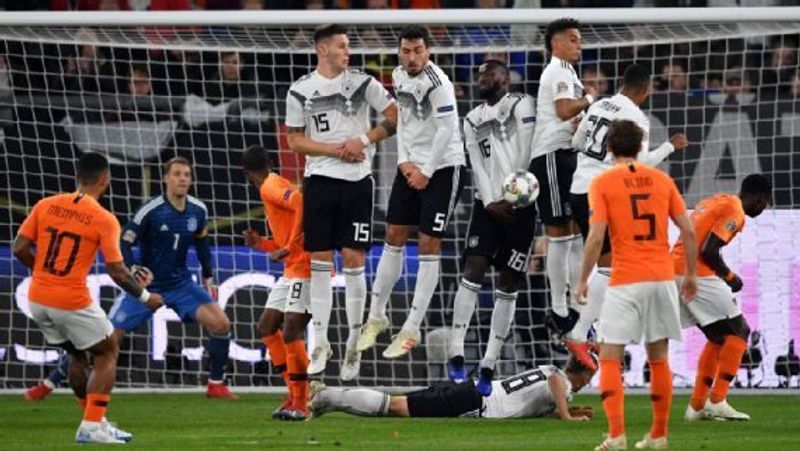
Joshua Kimmich lies down behind the free kick wall
Joshua Kimmich, a highly acclaimed young defender for Bayern Munich, made a significant contribution to European football by reintroducing the classic "long border" technique during a Nations League match between Germany and the Netherlands.
Leonardo Spinazzola
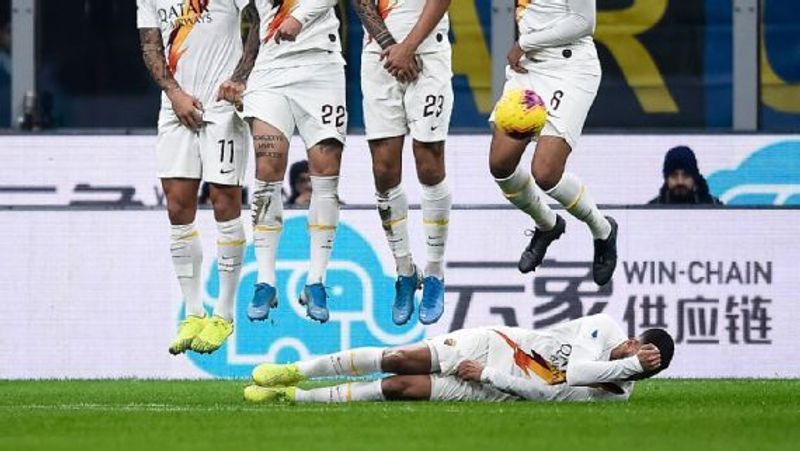
Leonardo Spinazzola lies down behind the free kick wall
The Serie A match between Roma and Inter ended in a goalless draw, partially thanks to Spinazzola's remarkable ground-level resilience. This could potentially be the first instance of this technique being observed in an Italian top-flight stadium.
Azer Aliyev
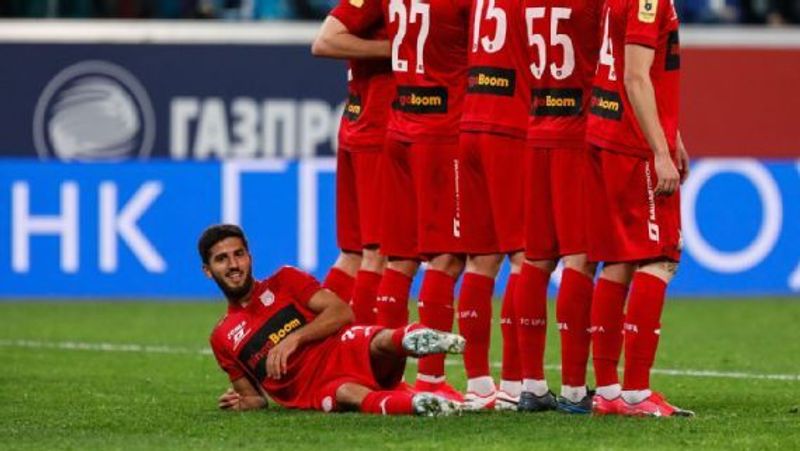
Azer Aliyev lies down behind the free kick wall
The technique has now made its way across Europe, reaching the Russian Premier League. In 2020, during a game against Zenit, Aliyev became the first player in the league to adopt the behind-the-wall position. Impressively, he appeared remarkably composed while executing the tactic.
Oliver Torres
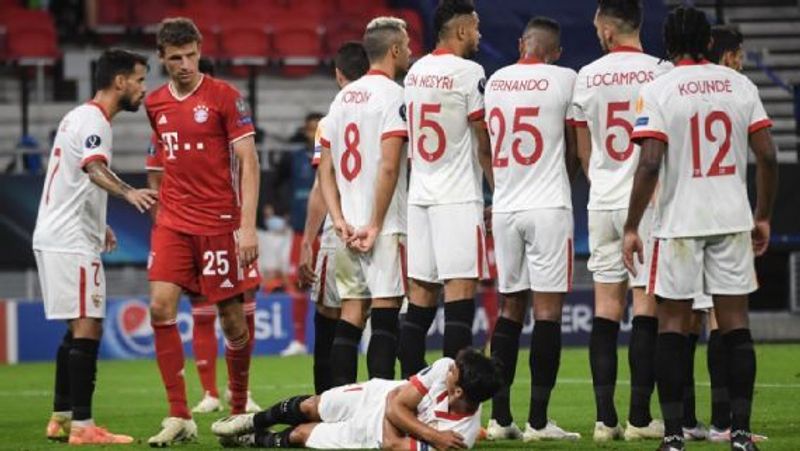
Oliver Torres lies down behind the free kick wall
Eager to demonstrate his skills on a grand stage, Sevilla midfielder Torres was aware of the global spotlight upon him as he went to ground to disrupt a set piece by Bayern Munich during the UEFA Super Cup final. Interestingly, Thomas Muller, known for his playful nature, appears less than impressed by the entire spectacle.
Antonee Robinson
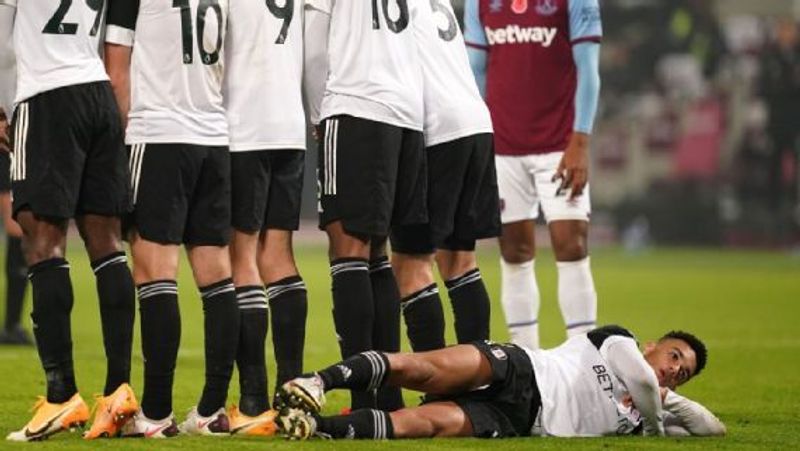
Antonee Robinson lies down behind the free kick wall
American left-back Robinson has taken on the role of Fulham's in-house under-wall specialist, as evident from his repeated adoption of the position throughout the current season. The young defender has displayed his skill by crossing his arms and effectively acting as a human shield. This tactic was successfully employed against West Ham in November, as well as in recent matches against West Brom and Newcastle.
Koke
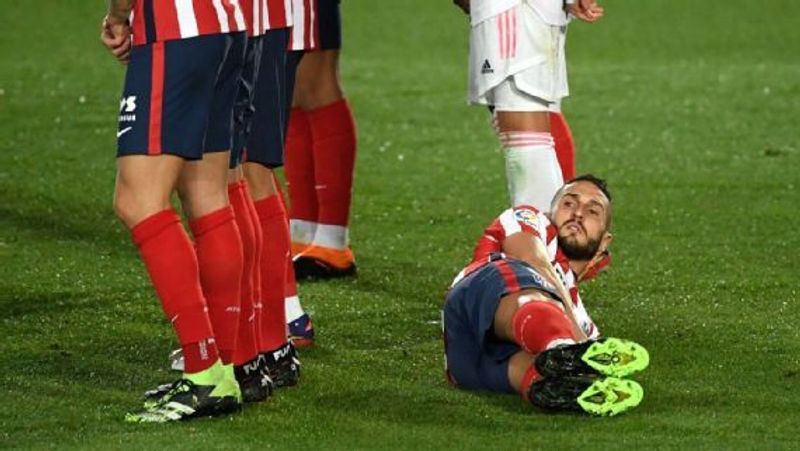
Koke lies down behind the free kick wall
Renowned for his tenacity in almost every situation, Atletico midfielder Koke appeared visibly nervous when he was assigned to position himself behind free kick wall in the recent Madrid derby. However, as the captain, he embraced the significant responsibility that comes with wearing the armband.
Juan Cuadrado
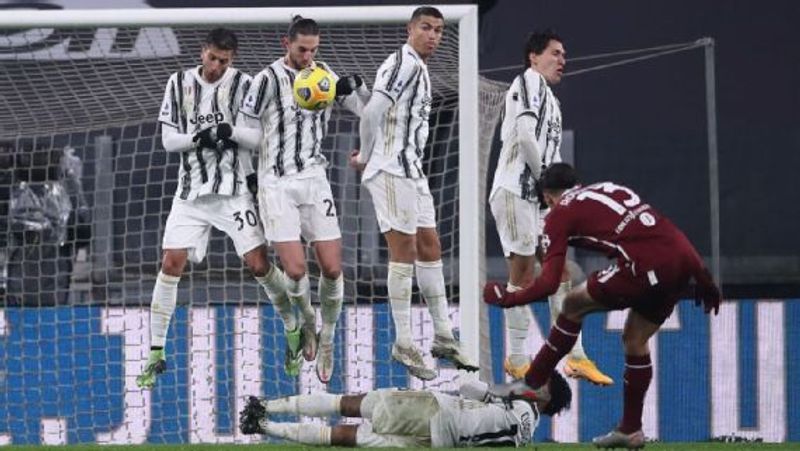
Juan Cuadrado lies down behind the free kick wall
While Cristiano Ronaldo displayed his trademark aerial prowess by leaping high into the air, Cuadrado got down and executed the gritty task of defending against Torino's set piece specialist, Ricardo Rodriguez, during the Turin derby in 2020.
Controversies and Criticisms
Strategic Advantage or Unfair Play?
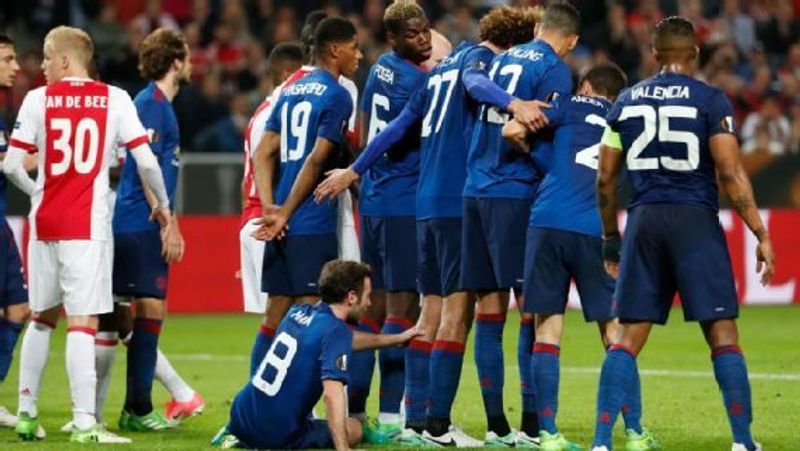
Lying down behind the free kick wall is strategic advantage or unfair play?
The practice of lying down for free kicks has sparked a fierce debate among football enthusiasts. Advocates argue that it is a legitimate tactic within the rules of the game. They believe that players should use every available means to gain an advantage, be it through physicality, mental tactics, or positioning. However, opponents view this behavior as deceptive and unsportsmanlike, stating that it goes against the spirit of fair play and integrity.
Accusations of Simulation and Deception
One of the primary criticisms leveled against footballers who lie down for free kicks is the accusation of simulation and deception. Critics argue that players often exaggerate contact or feign injury to deceive the referee into awarding a free kick. This behavior is seen as an attempt to manipulate the outcome of the match by gaining favorable decisions through deceitful means.
Disruption of Game Flow
Lying down for free kicks can disrupt the flow of the game, leading to frustration among both players and spectators. Opposing teams may contest the decision, arguing that it disrupts their ability to defend effectively. The stoppage in play can also result in a loss of momentum and excitement for the spectators, who expect a continuous and dynamic match.
Impact on Fair Play and Sportsmanship
Fair play and sportsmanship are fundamental principles in football. The act of lying down for free kicks raises questions about the ethical conduct of players. Critics argue that this behavior tarnishes the reputation of the game and undermines the values of fair competition, honesty, and respect for opponents.
Criticisms from Players and Coaches
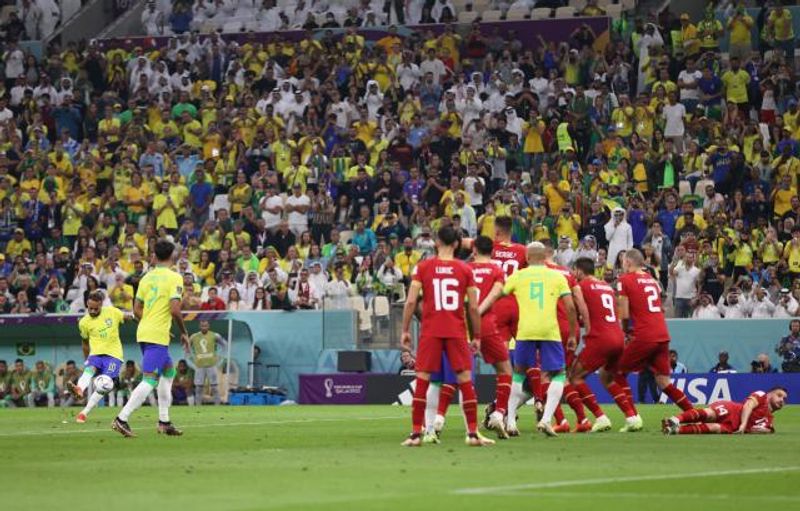
Many footballers and coaches have expressed their dissatisfaction with the practice of lying down for free kicks
Numerous football players and coaches have expressed their dissatisfaction with the practice of lying down for free kicks. They believe it sets a poor example for aspiring young players and contributes to the erosion of the game's integrity. Critics argue that football should be about skill, teamwork, and fair competition, rather than resorting to questionable tactics to gain an advantage.
Referee's Dilemma and VAR Intervention
Referees face a challenging task when it comes to adjudicating free kicks where players are lying down. Determining whether a player is genuinely injured or simulating contact can be difficult, especially in real-time situations. The introduction of Video Assistant Referee (VAR) technology has provided an additional layer of scrutiny, allowing officials to review incidents and make more accurate decisions.
Attempts to Address the Issue
Football governing bodies have recognized the controversies surrounding players lying down for free kicks and have taken steps to address the issue. Referee guidelines have been revised to discourage simulation and to penalize players who engage in unsportsmanlike behavior. However, finding the right balance between legitimate tactics and deceptive practices remains a challenge.
Calls for Stricter Punishments
To deter footballers from lying down for free kicks, there have been calls for stricter punishments. Some propose increasing the severity of penalties for simulation, including retroactive disciplinary measures for players found guilty of deceiving referees. By imposing harsher sanctions, it is hoped that players will think twice before engaging in such tactics.
Perception and Reputation of Footballers
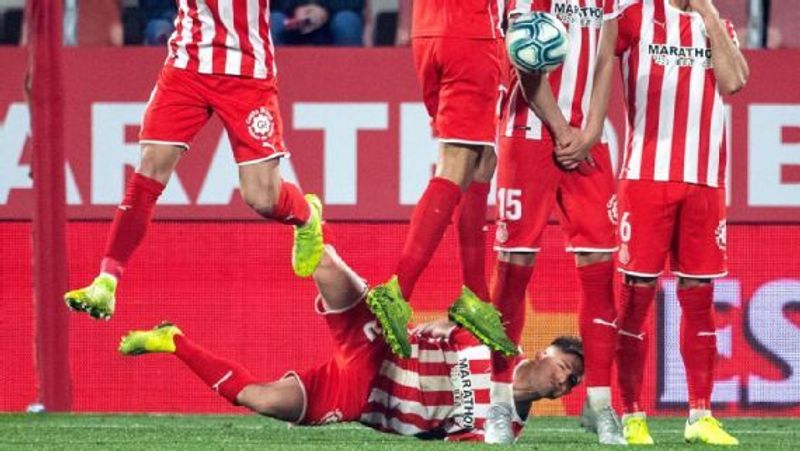
The controversies about lying down for free kicks have an impact on the perception and reputation of footballers
The controversies surrounding lying down for free kicks have had an impact on the perception and reputation of footballers. Some players have been labeled as "divers" or "cheaters" by fans and the media, which can harm their standing within the football community. The criticism faced by these individuals highlights the importance of maintaining integrity and fair play to preserve a positive image.
Media and Fan Reactions
Media coverage plays a significant role in shaping public opinion on the controversies surrounding lying down for free kicks. The issue often generates intense debates and discussions among pundits, journalists, and fans. While some defend the practice as a legitimate strategy, others condemn it as an unethical act that tarnishes the sport's reputation.
FAQs - Why do footballers lie down for free kicks?
- The line between gamesmanship and cheating can be blurry. While some instances may cross the ethical boundary, others fall within the realm of strategic play. It ultimately depends on the intent and severity of the deception.
- Referees face the challenge of detecting deception in real-time. They rely on their experience and judgment to make decisions. In recent years, technology such as VAR has been introduced to assist in reviewing contentious situations.
- Yes, lying down can disrupt the opponent's momentum, waste time, and create confusion on the field. These strategic elements can give a team an edge in certain situations.
- Depending on the severity of the simulation, players may face disciplinary action, including yellow or red cards. Additionally, public backlash and damage to their reputation can occur.
- Players raise their hands to signal the referee to halt the game and grant a free-kick or penalty kick. This action serves two purposes: firstly, to highlight a potential foul that has occurred, and secondly, to assert their team's ownership of the ball.
- The free kick wall plays a vital role in the defensive aspect of football, as players form a line beside each other to shield their goal from free kick dangers. In order to stop the ball from going over the wall, players often jump, but this has resulted in a prevalent method of deceiving the wall by shooting underneath it.

Related Content
